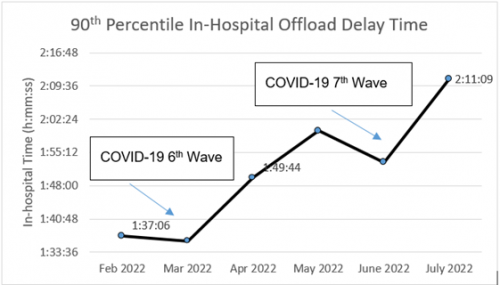
The COVID-19 pandemic has impacted every part of the healthcare sector, including paramedic services. In-hospital wait times for Paramedics to offload patients at emergency departments is the most significant challenge, as it creates risks for patients by negatively impacting ambulance availability in the community which delays response time to 911 emergency medical calls.
Emergency call volumes have returned to pre-pandemic levels, driven by an aging and growing population. Absences due to illness and WSIB are adding to staffing and system pressures. This situation is expected to continue impacting service delivery in 2023.
Toronto Paramedic Services has implemented all-Divisional contingency measures to support ambulance availability and frontline staffing, including:
Many hospitals continue to experience very long offload delays. Collectively, Paramedics spend approximately 800 hours in hospital each day. If this trend continues, Toronto Paramedics will have spent nearly 300,000 hours in hospital in 2022.
Currently, the Ministry of Health funds the Dedicated Offload Nursing Program (DONP), which dedicates a nursing resource to each hospital emergency department to reduce ambulance offload delays. Additional DONP funding has been requested from the Ministry of Health for the Provincial 2022/2023 fiscal year. The Province has also committed (through its Plan to Stay Open released in August 2022) to continue to expand 911 models of care, giving paramedics the flexibility to treat patients and have them stay at home, take them to a more appropriate care centre, or treat and refer them to another care provider.
Toronto Paramedic Services continues to work with hospital partners and the Ministry of Health to alleviate offload delays and return Paramedics to the community. The City has identified the importance of the Province treating Paramedics as a specialty resource that are prioritized for immediate triage and transfer of care at hospitals, and to be released back into service in all circumstances.
In June 2019, City Council adopted Toronto Paramedic Services’ multi-year staffing plan to address system and frontline workload pressures, and to support staffing levels (EC5.3).
Toronto Paramedic Services is governed by the Ontario Ambulance Act and is responsible for all aspects of land ambulance service for the City of Toronto. Half (50%) of provincial funding supports land ambulance operations whereas the Communications Centre is fully provincially funded.
The graph below shows the continuous increase in Toronto Paramedic Services’ in-hospital offload delay times over the last six months. The times are measured at the 90th percentile, meaning that up to 90 per cent of offload delays are represented by the times shown by month.

Toronto Paramedic Services has worked with Ontario Health and hospitals to create a best practices ‘Toolkit’ to promote consistent and safe approaches to reduce ambulance offload times.
In-hospital wait times and the negative impact on ambulance availability result in response time delays to 911 emergency calls and negatively impact all residents, particularly vulnerable seniors who are one of the primary groups accessing these services due to an aging and growing population.
Paul Raftis
Chief Paramedic Services
Paul.Raftis@toronto.ca, 416-392-2205